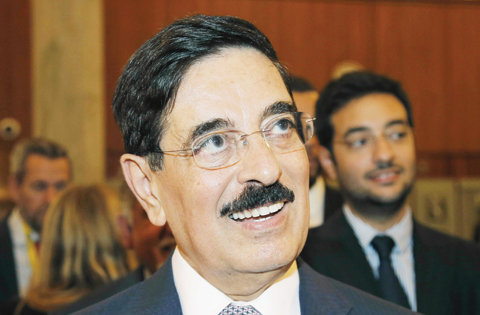Doha says hosting of World Cup 'not up for discussion'
 PARIS: Hamad bin Abdulaziz Al-Kawari, Qatar's candidate for the election of the United Nations Educational Scientific and Cultural Organization's new leader, smiles at the UNESCO headquarters yesterday. - AP
PARIS: Hamad bin Abdulaziz Al-Kawari, Qatar's candidate for the election of the United Nations Educational Scientific and Cultural Organization's new leader, smiles at the UNESCO headquarters yesterday. - APPARIS: Arab states may want their turn at the helm of UNESCO, but the barbs hurled by Egypt at rival candidate Qatar during the vote highlights the fractious geopolitics paralyzing the workings of the UN cultural agency. The Paris-based body is known for designating World Heritage sites like the ancient city of Palmyra in Syria and Grand Canyon National Park, but it has struggled for relevance as it becomes increasingly hobbled by regional rivalries and a lack of money.
France and Qatar were running neck-and-neck in the race to lead the troubled cultural body after a third round of voting yesterday whittled the field down to five. Qatar's Hamad bin Abdulaziz Al-Kawari and France's Audrey Azoulay - both former culture ministers - had 18 votes apiece in the battle to replace outgoing UNESCO director-general Irina Bokova.
Behind them in the secret ballot was Egyptian career diplomat Moushira Khattab with 13 votes and China's Tang Qian with five, according to results posted on UNESCO's website. Vera El-Khoury of Lebanon came last on four votes. Thirty votes are needed to clinch the nomination. The winner must be approved by UNESCO's 195 member states in November, though this is seen as a formality. Vietnam's Pham Sanh Chau dropped out of the race yesterday, having scored five votes in the second round. Candidates from Guatemala, Iraq and Azerbaijan have also given up.
The row between Qatar and Egypt has its roots in the crisis engulfing Qatar and its Gulf Arab neighbors which have severed diplomatic, trade and travel ties with Doha after accusing it of sponsoring hardline Islamist groups, a charge Qatar denies. "The dispute has been bubbling for several months, but what we're seeing with the Arab candidates is that they are extremely divided. Some of the clashes are quite virulent," said one UNESCO ambassador.
Egypt, the Arab world's most populous state which has joined the boycott of Qatar, has not shied from making its feelings about Qatar's UNESCO bid clear. In an interview with Egypt Today and re-tweeted by the foreign ministry, Egypt's top diplomat Sameh Shoukry suggested Qatar was using its financial power to influence UNESCO's 58-member executive council.
"It is an organization that is owned by international society and cannot be sold to a particular state or individual," he was quoted as saying when asked about the Qatari candidate's campaign logo "I'm not coming empty handed". A diplomat at Qatar's embassy in Paris declined to comment. A Qatari official at UNESCO's headquarters also declined immediate comment.
Egyptian candidate Khattab's first message on Twitter in three months was a re-tweet of an article in the Israeli press entitled "Israel bemoans emerging Qatari victory in UNESCO leadership vote". Kawari, the Qatari candidate, has so far not reacted to the Egyptian allegations, simply tweeting yesterday: "Al-Kawari tipped to head UNESCO". Voting lasts over a maximum five rounds. If the two finalists end level, they draw lots. "You get the impression that some are playing politics and competing for the sake of having a post rather than actually wanting to secure the future of the organization," said a European diplomat.
Separately, Qatar yesterday strongly criticized Emirati officials for questioning Doha's hosting of the 2022 FIFA World Cup, saying that the tournament "is not up for discussion or negotiation" amid the diplomatic crisis engulfing the region. This shows the boycott "is founded on petty jealousy, not real concerns," a statement from Qatar's Government Communications Office said. "This demand is a clear attempt to undermine our independence. The World Cup, like our sovereignty, is not up for discussion or negotiation," it added.
Lobbying firms and interest groups funded by the boycotting Arab nations increasingly have focused on Qatar's hosting of the football tournament. They've pointed to allegations of corruption surrounding Qatar's winning bid, as well as the conditions that laborers working in Qatar face in building infrastructure for the games. Such conditions are prevalent across Gulf Arab nations.
On Sunday, a Dubai security official wrote on Twitter that the only way for "Qatar's crisis" to end is if Doha gives up the tournament. Lt Gen Dhahi Khalfan later said his "personal analysis" of the financial pressure Doha faces in hosting the games had been misunderstood. On Tuesday, Emirati Minister of State for Foreign Affairs Anwar Gargash followed up by writing on Twitter that Qatar's hosting of the games should "include a repudiation of policies supporting extremism & terrorism".
Bahrain, Egypt, Saudi Arabia and the UAE began their boycott of Qatar on June 5. Mediation efforts by Kuwait, the US and others so far have failed to resolve the diplomatic crisis, the worst to hit the Gulf since Iraq's 1990 invasion of Kuwait. When Qatar's sole land border with Saudi Arabia was closed and sea traffic cut off by the boycott, World Cup organizers were forced to instigate a "Plan B", including bringing in supplies from Turkey. Qatari authorities say their efforts at building stadiums and infrastructure for the tournament, the first to be held in the Mideast, remain on track. - Agencies










